#pathologic meta
Text
I just realised, in the original Pathologic, Daniil is the only protagonist whose ending doesn’t require the others. Aretemy is killed by Oyun’s final trial without Clara’s help and the sacrificing of Clara’s bound serves to provide Artemy with the blood he needs to make the panacea. However, while Daniil crosses paths with the others in ways that forward his plotline, his story begins and ends with isolation. He enters the town alone and he leaves the same way.
He is the eternal outsider - to the town and its people, to the Powers That Be who call him the “bad guy” played by the “scary clown doll,” and to life itself as his obsession with stopping death intrudes upon his capacity for living. Daniil is so tragically and inescapably alone. And yet, as we see in the Haruspex’s story, when he has someone else to share the burden with and to help him understand this strange, alien world, he flourishes and shows himself to be so much more than the jaded, resentful, defeated man he becomes by the end of his plotline.
It makes me think that the real solution to the plague is something that exists in a space where all three protagonists act together. The brain, the body, and the soul united not only in their goal, but in their actions.
I just have a lot of feelings about Dankovsky, ok? He’s just so... human.
#pathologic#pathologic meta#daniil dankovsky#artemy burakh#clara changeling#clara pathologic#pathologic bachelor#pathologic haruspex#pathologic changeling#ice pick lodge#burakhovsky
465 notes
·
View notes
Text
Pathologic and Edward Gordon Craig
In this episode, one very tired theatrology student will try to explain how Craig's ideas about actors and theatre in general might have factored into the way theatre is used in pathologic, especially when it comes to minor changes made between patho classic and 2. We'll talk about puppets vs actors, the role of directors and how it all relates to death. Yay!
SPOILERS FOR BOTH GAMES AHEAD
THEATRE IN PATHOLOGIC

So, anyone who's seen Codex Entry's video essays might be aware that Pathologic very visibly uses and plays with various theatrical ideas and concepts, especially when it comes to XXth century avantgarde movements. So far, Ruby has discussed the influences of Artaud (my boi), Brecht and Beckett, but today we're going to take a little step back and focus on one thinker who might have just been on of the most important theatre theorists ever and whose ideas definitely influenced all those that came after him. We're talking about our favorite theatre malcontent- Edward Gordon Craig
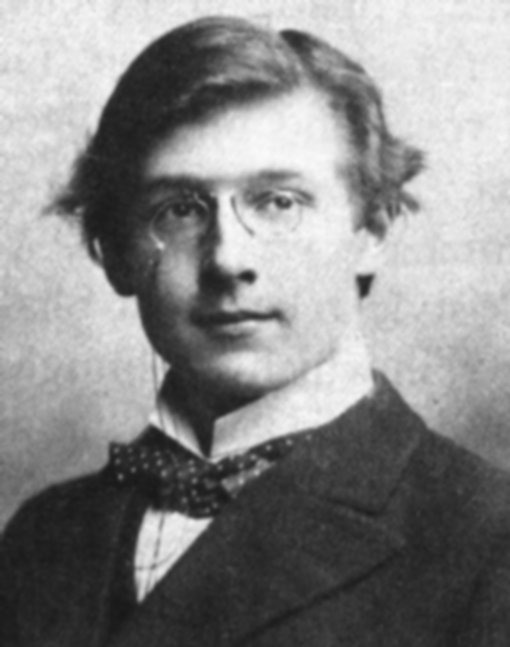
Soo, Craig was a theatre theoretician, actor, director, and founder of the magazine "The mask" back in the 1910s. In it, Craig would talk about his thoughts on theatre, which were largely counter-cultural, at least in comparison to the standard established back in the mid XIXth century. His works are often cited as fundamental to the Great Reform movement, which included among others, Stanislavsky, Reinhardt, and Appia. Their works paved the way towards avant garde theatre and a completely new understanding to it.
Now, why is Craig so important? Basically, he complained a lot and had very cool, albeit sometimes impossible ideas which were later inspired other in creative ways. His main ideas were:
Theatre is not a synthesis of other arts but rather something autonomical, unlike SOME OTHER PEOPLE THOUGHT (im loking at you wagner)
The director>>>>>>>> some dumb smelly actors
The actor shall one day be replaced by the Uber marrionette (tm)
Today we'll focus on those last two, since they are interconnected and most relevant in Pathologic.
The second point is pretty self-explanatory. Craig proposed that the director and their vision is the most important part of any given theatre show. The director should have a holistic vision, knowledge about all the arts participating in theatre and abilities to make their ideas reality. Before that, directors were more like the caretakers of shows, while the main focus was on the star actors. And this way of thinking leads us directly toooo:
THE UBER MARRIONETTE
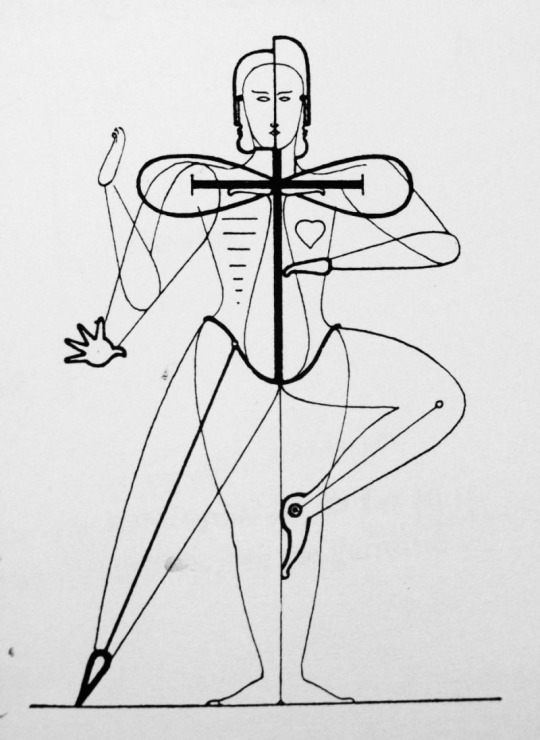
(project by Oscar Schlemmer)
So, what is the uber marrionette? Basically it's a slightly esoteric idea that somewhere between puppets and living actors exists a form which would be perfectly responsive to the director's artistic vision. Human actors were ego-driven, restricted by their bodies and minds which generally not malleable enough to be a good material, even going so far as to suggest that acting is not an artform at all, since it is driven by chance and not specific intentions.
In contrast to that, Craig explained the nature of puppets- perfectly controlled, humble, objects of worship. And also symbols of death. Which he thought of as perfection. So, in some way, a perfect actor is a ...dead actor. Or, not literally dead, but posseing the perfect stasis of death, one usually assosciated with inanimate objects.
OK, WTF?
As I mentioned those ideas are very cool theories but are rather hard to actualize in the real world, especially since Craig was sometimes vague about what he ACTUALLY wanted to see. He would complain about people misinterpreting his works and declaring that he wants to replace actors with literal machines, while also never specifying what he actually meant. So different artists tried to bring his ideas to life, mostly by "mechanising" living actors, or using some blend of life and artificiality. In practice it was mostly shit like putting actors in giant metal pots and making them communicate in mono syllables to restrict their natural expressions od self as much as possible

OK, BUT HOW DOES THAT RELATE TO PATHOLOGIC?
So my theory is, that by portraying the player character(s) as puppets in classic, and as actors and tying all of this to the idea of death, the makers of PAthologic are playing (pun intended) with the concept of the uber marionnette and maybe even proposing a solution to this impossible problem.
Let's start with classic, because it's pretty straight forward. The characters are dolls/puppets (I'll be using those words interchangibly because fundamentally they serve the same purpose). The theatre itself is specifically said to host puppet shows (which is in itself a nod to the long standing tradition of folk puppetry in Russia and other eastern european countries)

Which in hindsight, are a direct reference to the fact that the very story you are playing is nothing more than a game/puppet performance hosted by in-world The Powers That Be and at the very top by the makers of Pathologic. In that way it is a very straight forward (but ultimately incorrect) use of the uber marionette- the player character is a humble vessel through which an idea is manifested. It's a puppet made out of polygons and lines of code instead of wood or felt. Your role as a player in this performance is two fold- you are both the puppeteer (the one who moves the dolls) and the spectator (because you are being told the story, not the other way around). What you are not is the Director- that role, personified by Mark Immortel and later by the Executor and Tragedian is out of reach for you. So, as you can see it's definitely using puppets, but not necessarily uber marrionetes.
AND THEN WE HAVE PATHO 2
So, the theatre inspirations in Patho 2 are a lot less...subtle than in classic, one of them being literally namedropping my boi Artaud's concept of the Theatre of Cruelty.

But what I want to focus on in this case is the seeming dissapearence of the puppet metaphor from the first game. You are no longer compared to a puppeteer moving a vessel, but to an actor inhabiting a role. A role which is in a way highly restrictive, since there are only four endings, and only two choices that actually impact what happens in the end (what you do with the documents, and whether you take the fellow travellers deal or not) You are faced with the idea that you are replacable, so your personal ego is not valuable to the director in universe and the game creators out of the universe. And finally, to make it even more interesting, you are in-universe faces with the neverending cycle of life and death, through the system of deaths having consequences/being part of the game's continuous timeline instead of just out of universe reloading. I think you might already see where i am going with this.
I THINK THAT THOSE TRAITS MAKE ARTEMY'S PORTRAYAL SIMILAR TO THE CONCEPT OF THE UBER MARRIONETTE
So not the concept itself, but something that heavily resembles the ideal version of what it could have been. Now, does it theory make perfect sense? No, but I thought it was a cool though experiment to do nontheless. The idea of an uber marionnette is onfusing theatrologists to this day, and many people have claimed to having founf a way to realize it, but since Craig himself was unclear about it, we will never know how relevan those tries were. But I still think that the topic of video games and theatre concepts is a fascinating one (that will probably be the topic of my bachelor's thesis lol), and pathologic is a perfect examples of those two ideas working together. If you have any other ideas about it, please let me know, and if you're interested i can make more posts about the theatrological angle of patho!!
134 notes
·
View notes
Text
The poetics of the Vlad the Younger vs Vlad the Older in so far the Haruspex and Bachelor Route are just keeping me up, and Vlad the Younger being a possible adherent, supposedly only removed for the sake of not accidentally auto-game-over as the Bachelor just adds to how interesting this choice is to me. Lots of musings below this, I do not know where I am going with this
Additionally, "Panacea Blackmarket" ALSO takes place on this day in which Vlad the Younger is linked to it, something that Daniil first detests ("The man won't let a single penny past his purse! It occurs to me that he is no better than Bad Grief), with a hint of Dankovsky-typical "wait maybe the worms framed Vlad for this, let me check"). The Bachelor is only to change his opinion once he finds out that Vlad is now trying to "make amends" by distributing the panacea to the people he had doomed (Yes, people do change a lot. Before, I was convinced that this man was beyond salvation. I thought that nothing less than death could make the leopard change its spots. But I see a new man before me now. His former self has died; but not before he gave the entirety of his panacea stock to Mark Immortell.)
"Subterrarean Rot", to me becomes interesting because Daniil very much likes to align himself with the truth and slowly and surely has been shown and expected to lie tooth and nail to protect himself. Finding our who is behind the Termitary's state, Daniil is originally to decide who to deliver to Taya, but his journal entry is SO interesting about this:
The whole thing proved to be a trivial affair, but no less terrifying for it. When Isidor informed the Olgimskys of the impending outbreak, it was the younger who did what the elder did not dare to. But as the consequences became known, it was the father who shielded his son from the ramifications. A double deceit. This being known, I am in a strong position to speak with the Olgimskys.
I remember my jaw dropping at this when I found out Vlad the Younger, who had seemed so reasonable, had been the one to lock up the Termitary, but Daniil describes him as doing "what the elder did not dare to." Calling Vlad the Younger out, he is more than ready to carry the consequences, while Vlad the Older decides he will take the blame for his heir. When Taya asks Daniil to bring him "who is responsible for it", he (and the game's writing in so far), identify Young Vlad for it.
So how would Daniil decide then when this is how it comes about? When the man is showing so much change? Well, he can take a third option and just not decide - he brings Taya her toybull instead.
And oh goodness? The potential conflict of "the truth is my shepherd" seeing a person who makes an effort to change (if genuine or not that, like so many things, another question) to deliver someone? The choice to take a third option because, in the end, what does this matter if there is a town to save?
It just says so much about what could be Daniil's priorities. It's fun! And then we have Artemy...
"A Son Will Not Be Punished For His Father's Sins" is already named in a very interesting matter - and it immediately calls back to the Haruspex's own position as a "son". This takes place on the day Artemy claims his inheritance in front of Foreman Oyun - it is the day where, unlike the Bachelor, Artemy himself CANNOT avoid making this decision - one of the Olgimsky men needs to die.
There are two fun layers to this - on the one hand it is learning that Taya does not directly care who of the guys she is getting (something I think she also mentions to the Bachelor but I cannot check right now) and learning more about the polcies of the families in the Steppe. Artemy learns it is common among the merchant families that one sacrifices himself to protect the heir at all costs - and that what matters is that someone is punished for a crime that is committed.
Artemy's journal entries for the quest are very interesting leading into this:
So, Vlad the Heavy surrendered himself to Tycheek's daughter? It's clear enough that he isn't the real culprit… I only have to decide if I should tell her the truth. I wonder how that story ends…
Once again, Day 8 offers another quest from Vlad the Younger, because we are all about parallels. This time it is "Below the Ground" where Artemy is asked to retrieve the book detailing the kin's history from the tunnels which may or may not have been a setup given that the tunnels are closed directly once Artemy has entered them . While the book itself is not succesful, it makes Artemy wonder about the parallels between him and Vlad as Vlad himself is also apparently trying to unearth something - though he speaks of him with much more distance (So, Vlad the Younger has managed to reach beneath the ground as well. Is he trying to emulate what I am doing? He has found life down below, just like I have. [...]The ancient wisdom of the Kin was concealed there, locked away until the moment I unearthed it. I'm almost amused by the coincidence.)
Surrendering Vlad the Younger to his death to Taya in also, wonderfully, framed as Artemy taking his place among the kin:
Yes. Let Vlad the Younger die. Whoever makes a decision will be held responsible for it. With every passing day, I feel that the life of the Kin is my own life. I must protect it and avenge its suffering. Whatever fate had in store for these few thousand people, Vlad the Younger is directly responsible for their death.
No. Let Big Vlad die. I should inform Georgiy of my decision. I wouldn't describe Vlad the Heavy as a sentimental man. If he chose to die, he must have had good reason to. Or could it be that he thinks he deserves the punishment?
Surrendering Vlad to Taya matches with Artemy taking his own place - and Vlad the Younger is thus not punished for his fahter's sins but his own, meanwhile Artemy is about to take his father's place and heritage, trying to finish what Isidor created.
An honourable mention goes to the entry as to letting Taya kill Vlad the Older instead:
I am excited to find out more about this, if there is more - knowing this is Pathologic there is certainly more but it will not bring more clarity. But what is it for Artemy then, to be the one choosing it is time for the father to die and thus for Young Vlad to take on his heritage? It certainly is missing the poetry of the entry when choosing Vlad the Younger - but it makes it just as interesting.
#pathologic meta#pathologic#pathologic spoilers#vlad the younger#haruspex route#bachelor route#daniil dankovsky#artemy burakh#pathologic classic hd
36 notes
·
View notes
Text
Thinking about Clara's redesign in 2 and how it more clearly illustrates that she's the "in-between" of the Haruspex and the Batchelor. With Artemy’s primary color being green (at least in 2) and Daniil's being red, Clara's green jacket, and red scarf and hat mixing the two together and also having her own colors, tan and pale blue. It's just interesting, methinks.
#I will forever miss her hair poking out of her hat though :(#pathologic#clara pathologic#мор утопия#pathologic 2#pathologic meta
51 notes
·
View notes
Text
Seeing ‘All Quiet on the Western Front’ everywhere (I read the book) and it made me realize- if we consider that the War talked about in Pathologic/Pathologic 2 that Artemy returns from could be a fictional equivalent to WWI aka the same war that is depicted in ‘All Quiet on the Western Front’...
Dear God. Artemy really swapped one battlefield to another.
And yet he is so compassionate, and kind, and fights tooth and nail to save his hometown and the people there from dying, and it makes even more sense how he is so driven - if he has seen even a small degree of the same devastation and traumatic events, he would want to protect his hometown from senseless death, from any more losses that he cannot prevent.
He first had to fight at the front of a literal, gruelling war (in which he was, more likely than not, essentially expendable), and then he has to return to his father being murdered and having to fight a highly contagious, deadly disease in the town he grew up in.
I’m going to cry if I analyze this further.
#pathologic#pathologic 2#pathologic spoilers#artemy burakh#pathologic meta#mine#the haruspex#cw war#tw war#cw wwi#tw wwi#war mention
95 notes
·
View notes
Text
So i finished pathologic classic.
My head is full and spinning. Here's what I think.
The Bachelor's science is about the progress of humanity in the future, but his ending represents the past: he wants to save the dreams of children eternally in the polyhedron.
The Haruspex's knowledge is rooted in tbe past of tradition of his culture, but his ending represents the future: his children will grow up and lead the town.
The Changeling... Takes the other two's contradictions and takes them to the extreme. She is both past, future, death and life. She is 15 but ancient, but one week old. There is two of them, but only one. And so in her ending, both childhood dreams and the responsibility of adulthood can coexist, but at a price.
Having also finished pathologic 2, i wanna study that game's ending in how they compare and contrast, but right now only the Haruspex is available. I'm very curious to see what endings they provide to the other two characters.
#daniil dankovsky#artemy burakh#clara saburova#pathologic classic hd#pathologic 2#also the italian translation is a mess#but that's a topic for a different time#mari plays videogames#pathologic meta
17 notes
·
View notes
Text

"he's jealous and possessive." sure, he has some passing thoughts like that yeah - and then later is like: well that was dumb of me
like... a horny teenager who is capable of self-reflection??? people who want him to be born evil the whole time and/or for the romance to never be real or sincere, not even well before his heel turn, are pathologizing some regular af stuff like having over the top horny thoughts you don't actually act on and think better of later
#coriolanus snow#the ballad of songbirds and snakes#ballad quotes#snowbaird#thg meta#my meta#a lot of modern fandom discourse#is just pathologizing the most regular crap
166 notes
·
View notes
Text
Pathologic fandom stop excluding Clara from stuff challenge
#the amount of times i’ve seen her not included in stuff is baffling#like i get it from a meta perspective#her route isn’t unlocked until you beat the game#but she’s still a main character 😭#she appears in the theater intro in p1 and she shows up a lot in p2#she deserves more than what she gets#especially when she is one of the most important#if not the most important#character in the whole game#i’m just tired of female characters being brushed aside for the men#like don’t get me wrong#i love artemy and daniil#but you can’t deny that they get way more attention than clara#pathologic#pathologic hd#pathologic classic hd#pathologic 2#clara pathologic#clara the changeling#clara saburova
236 notes
·
View notes
Text
an interesting lens to analyze pathologic would be through the ways it references commedia dell'arte. part of it is that the conventions of commedia have left a lasting imprint on theatre, puppetry, and performance in general, but i think there are some very specific nods as well.
for an obvious point, farcical character archetypes represented by masks were an essential aspect of the art form. pathologic not only uses that concept in mark immortell's masked plays, it also uses the same two types of masks: a flat mask that covers the face with holes for eyes and mouth (also comparable to ancient greek theatre masks), and a mask featuring an exaggerated, beak-like nose.
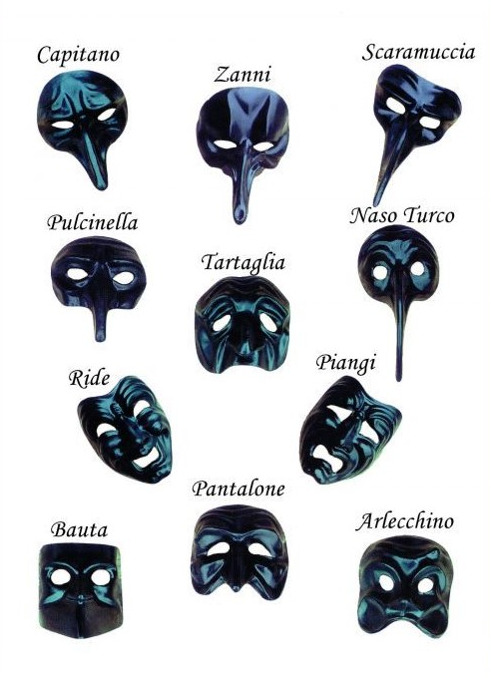
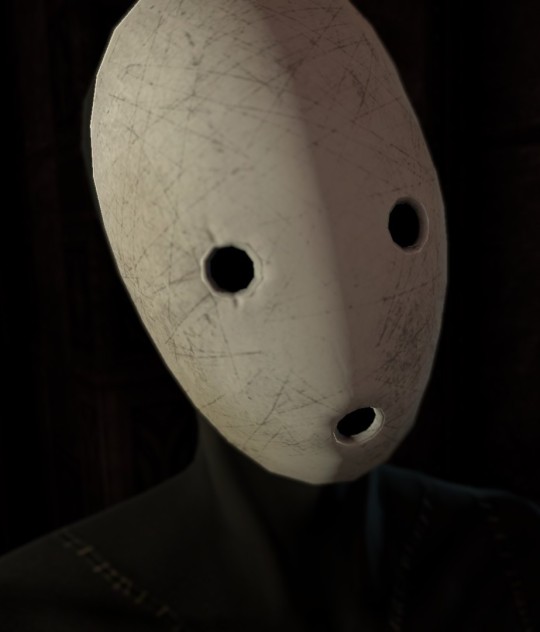
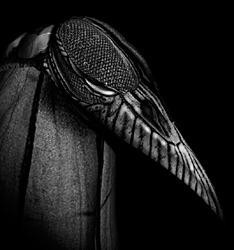
i'd say there are also references to the commedia archetypes in the actual characters themselves. for example, i'd be surprised if "vulgar comedies" wasn't an intentional reference:
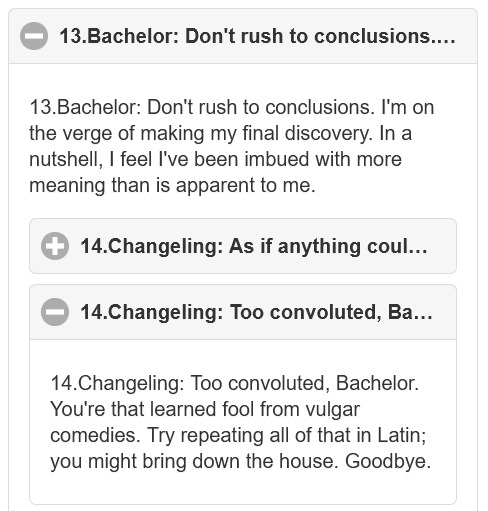
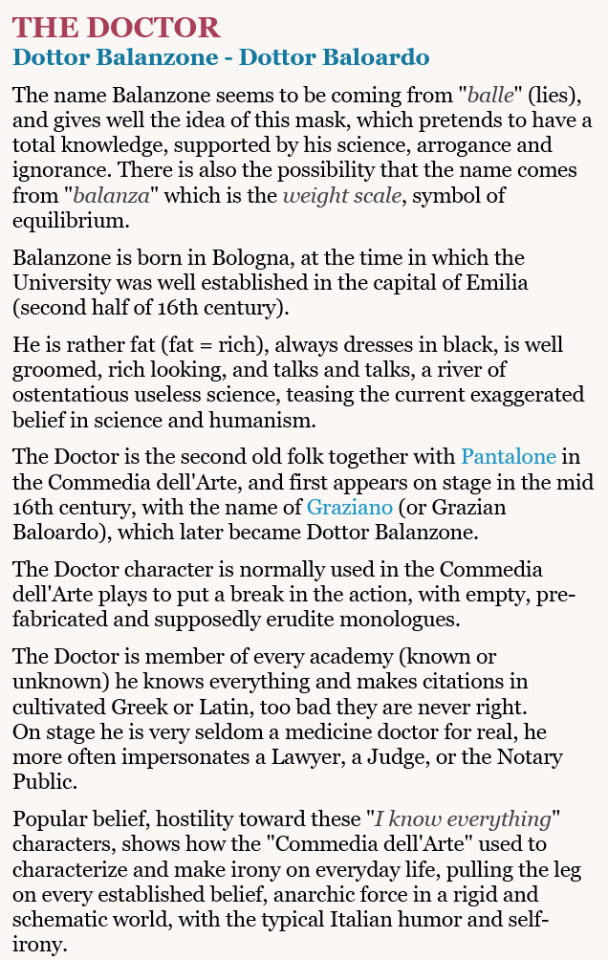

(i don't have a clear translation of "площадных комедий", the term that clara uses for "vulgar comedies" in russian, but the russian wikipedia page for commedia dell'arte is the first thing to come up when I google it.)
that's not to say i think the game is trying to completely frame dankovsky as il dottore, the laughable caricature of a psuedointellectual. but clara certainly sees him as one! and arguably his characterization is closer to this archetype in her route, as well as in the pathologic 2 haruspex route (mister "i was blessed with a naturally high intelligence", among other hits). these differences are possibly an indication of unreliable narrator.
after all, changeling's route is from the POV of a religiously-fixated teenager who sees the world in terms of stark good and evil, and whose character is bifurcated between pure good and pure evil herself. arguably the NPCs in her route act as elevated, exaggerated versions of themselves due to her perspective. and pathologic 2 leans harder on the "it's all a play" framing device than the original game did, giving the player a role to embody and making NPCs feel more like characters who exist for the purpose of the play (and for artemy as the protagonist) than as fully realized people. hence how in p2!artemy's first and last confrontation with the bachelor, you find him staged dramatically in a room cast in mood lighting as though his sole purpose is to wait there for you to enter. (well, either that or it's just that he's a drama queen.)
at least, that's one interpretation of why he comes off as more of a pompous twit depending on the route. another aspect of commedia dell'arte is that the protagonists often go unmasked, and relatively unexaggerated, compared to the masked villains and comic relief characters. bachelor is the protagonist of his own story, and arguably the deuteragonist of the haruspex route. but in changeling route and p2 his role is more of a bit player among many, cranked up into the role of learned fool.
#mine#pathologic#this focuses a bit on daniil just because that dialogue is what first put the commedia dell'arte connection in my mind#i'd like to look into other examples/allusions but i'd have to read up way more on the history of the art form and theatre in general#which i'd enjoy doing regardless#patho#patho meta
153 notes
·
View notes
Text
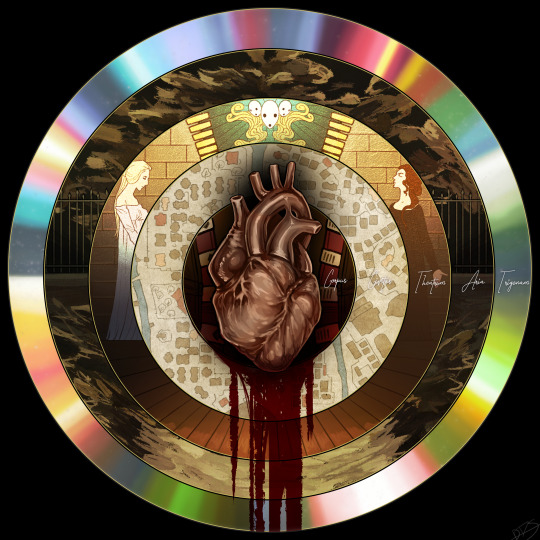
like the pages of a book soaked shut by time
#pathologic#pathologic 2#heart#victoria olgimskaya#nina kaina#daniil dankovsky#the powers that be#how many layers of meta is your game on bro haha#girls when theres metaphors for dantes inferno at the function
182 notes
·
View notes
Text
What is most Russian about Pathologic is the saccharine desire to find utopia in the past.
The kids are a reflection of their parents... a good mother has a good daughter, like Capella. A "bad" mother begets Maria.
The character of Burakhs gets passed on from father to son... while the mother is a mere reflection of the town which dissolves the Kin heritage which Burakh and Isidor try to hold on to.
The hope is that the children will be like their parents, only, a little bit better. Still the same in all the ways that matter. A leader only sires leaders. And biggest failure a mother can have is to be barren and purposeless...
The classic conservative leanings are so, so strong.
God forbid anything meaningfully changes, ever. Stretch the mind, but find comfort in the old unchanging structures.
#sonntam talks#pathologic#pathologic negativity#as much as i love pathologic in close up#it is hugely a meta narrative game#and like a lot of of the narrative choices raise questions to which i cant find any flattering answers
139 notes
·
View notes
Text
Something interesting about Pathologic that I don't see people talk about very often is the fact that technically none of the protagonists are doctors and, of the three, it's actually Artemy that's the closest to a real physician.
The fact that Daniil is specifically referred to as a "Bachelor" of medicine is something that was always sort of confusing to me but is actually extremely telling when put together with all the other details we get about him.
There's an excellent video essay about Daniil's character by Horror Game Analysis which goes into more detail about this [x], but he points out two things about thanatology that I think are really significant:
It was first conceptualised as a field of study in 1903 by Ilya Mechnikov, a Russian-Ukranian immunologist and microbiologist, who felt that there was not enough known about the phenomenon of death itself; and
Thanatology straddles the line between the humanities and the sciences because it's investigations grapple with the physical, psychological, socio-cultural, philosophical, and spiritual elements of death
With all that in mind and Pathologic's ambiguous time period, Daniil could very much be read as the in-game world's equivalent of Mechnikov. Despite his (sort of) alignment with the philosophically-minded Kains, Daniil is consistently shown to be very much focused on the physical components of death. He came to the town hoping that "[Simon's] tissues will help [him] defeat death." Rubin, Artemy, Victor (and Lara, Yulia, Aspity, Anna, and Clara) all need him to collect and examine blood samples for evidence of the disease. Once the plague begins, his focus in on the creation of a vaccine - a tool for immunisation - instead of a cure.
All of the evidence points to Daniil, at his core, being a microbiologist and researcher. His medical knowledge, while far above average, is highly specialised and doesn't indicate that he has any practical experience as a physician. He's not a doctor, he's a bachelor of medicine using his theoretical and academic expertise to fight an impossible disease in the only way he knows.
Now, Artemy does have some practical knowledge. Isidor taught him about the traditional medicine of the town while he was growing up before sending him to "study modern medicine in the academy" when he was 16. However, in his opening description, all we are told is that Artemy is returning from several years of "travelling from town to town learning theoretical and pratical surgery." In Pathologic Classic, Artemy is canonically 26 years old so if he spent 6-7 years travelling, his formal medical education was likely either short or incomplete. Not to mention that the emphasis on Artemy as a surgeon and menkhu (much like Daniil as a bachelor and thanatologist) implies a very specialised area of expertise which, although closely related to practical medicine, is not the same thing.
This is reinforced in a number of ways. For example, while there are multiple dialogue options which let you dismiss the town's local medical practices, they appear mostly (or only) in conversations with outsiders - responding to Daniil's admission of underestimating the value of "steppe medical knowledge" with "there's nothing medical in their knowledge" and telling Block that he has "an education in the civilized world and ha[s] forgotten two thirds of the specific local practices." Ultimately, Artemy is more consistently aligned with the Kin's more bodily approach to medicine. That distinction between Kin and Town is important, since the traditional medicines Artemy makes are not valued or trusted by townspeople and the kin refuse almost all of the modern medicine (specifically antibiotics) sold in the town.
He also seems to be either unfamiliar or seriously out of practice with the more formal language of science and medicine a university-educated physician should know. At several points, Artemy is shown to be dependent on Daniil's medical knowledge, and various members of the town poke fun at him for asking clarifying questions - Boy: "You graduated from a university and this is your question…?" Rubin: "I thought you were [away] studying." Artemy's story is about trying to fill his father's role and, while he succeeds in becoming a menkhu, his position as the town's doctor is less clearly defined even after the plague. While he begins the game with the most practical experience of the three protagonists, the fact that he's not qualified to be a physician but has to act as one is what drives his story forward.
I won't go into Clara since it's obvious she's not a doctor. If anything, she's more like a personification of a cure for this one specific disease (just like her 'twin' is the plague). She couldn't reset a bone or diognose the flu any more than she could synthesise antibiotics or distinguish between bacteria in a blood sample. Still, she's an interesting comparison point and does serve to remind the player that the protagonists don't really represent different approaches to medicine, but different approaches to healing.
The Bachelor is the modern healer of formal scientific practices who sees healing as the result of understanding the body, disease, and their interactions.
The Haruspex is the traditional healer with the spiritual or ancestral right to protected knowledge and practices who sees healing as a reflection of cultural duty, customs, and community.
The Changeling is the divine healer chosen by a Deity (or Deities) to carry out their will on earth who sees healing as an act of religious faith and demonstration of the existence and power of God(s).
#this took way longer to write than I expected holy shit#also can you tell that Daniil is my favourite?#pathologic#pathologic meta#pathologic classic hd#pathologic classic hd meta#daniil dankovsky#artemy burakh#clara saburova#clara changeling#pathologic bachelor#pathologic haruspex#pathologic changeling
302 notes
·
View notes
Text
Thinking about theatre themes in patho classic and 2 and how they changed the metaphor from portraying the characters as dolls (ergo drawing paralels to puppet theatre) to replacable, human actors. Has anyone used the concept of Craig's übermarionette in relation to patho? Maybe I should do it then
17 notes
·
View notes
Text
A thought I had about Pathologic 2 Eva Yan is that she's a physical reflection of the player character's motivations and narrative throughline. This is only a thought (I hesitate to say Theory. You get it) insofar as only Haruspex is out, but with news of Bachelor approaching is worth considering.
Pathologic Classic HD Eva is a Utopian, reflective of Bachelor. She remains a Utopian for all three routes, unchanging from an ideological standpoint. In Pathologic 2 Haruspex route, however, she's wildly different; perhaps the character with the biggest redesign, visual and ideologically. But her personality is the same. She's airheaded, spiritual, and incredibly naive. In Pathologic 2 Haruspex, now consider her a reflection of Artemy. Not a friend, but a parallel; a manifestation of his narrative strapping itself to Eva. That leads her to appropriating his culture, donning a facsimile of what herb brides wear and dancing among them despite being wholly and fundamentally at odds with their way of life. But she will not back down, forever determined to join them. She will die in the nocturnal ending, of course. She's not immune. But she's not a tabula rasa. She's not reflecting Artemy's motivations one-to-one, but steeped through what is fundamentally Eva. She's reflecting not only him and his route, but on an in-game AND narrative level, the racism of the town. She's a white lady after all, and there's no nonracist way a white lady can reflect the Indigenous traditions and culture of the Kin.
Seeing a glimpse of her redesign for Bachelor route makes me interested in seeing her portrayal in his part. I think she will be different than her portrayal in P2 Haruspex route, and instead be more similar to her Classic HD characterization; rewritten into a reflection of the Bachelor's goals and his story's throughline. I think she will be an earnest sycophant towards him, dreamy and romantic about the capital, or perhaps about death itself. That's certainly in line with her characterization in Classic HD. And then, in a thousand years, we would see how she's portrayed in Changeling's route as a reflection of her ideology.
Pathologic 2 Eva is a character not only doomed by the narrative but sculpted by it too. Sculpted by the motivations and ideologies of the PC. On a story level she's a woman who once an idea forms in her head, will follow it to its conclusion without a second thought, dreamy yet adamant in her procession. She embodies the soul of the cathedral, embodies the Utopian ideal! Just as she embodies the holistic methods of the Haruspex, for better or worse.
I've spoken of Eva on many different levels of meta here. I don't think it will "be confirmed" in the upcoming P2 Bachelor route that she is wholly shaped by each narrative, but I think it would be interesting if they explore her this way. I would, anyhow.
#Ah! Eva Yan meta analysis- the reason I play pathologic. Or one of them at least. She's my favourite#I hope I've articulated this adequately. I'd love to hear your thoughts#I've a distaste for ''theory'' style discussion. I'd rather discuss interpretation and symbology. Story as story. Etc. Media analysis baby!#So I hope this does not come across as theorycrafting or discussing ''secret meaning'' a la idk. mascot horror#Just portrayal and potential. I'm interested in seeing how it goes#pathologic#eva yan
26 notes
·
View notes
Text
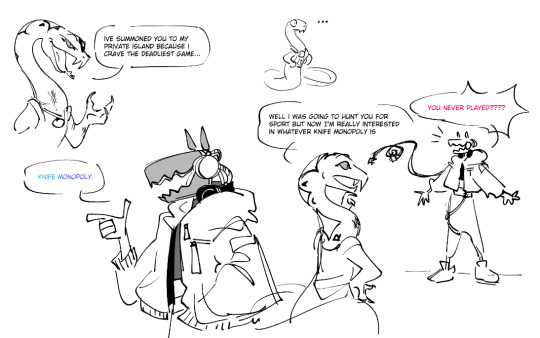
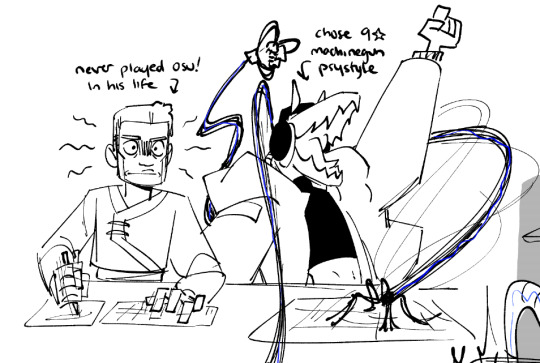
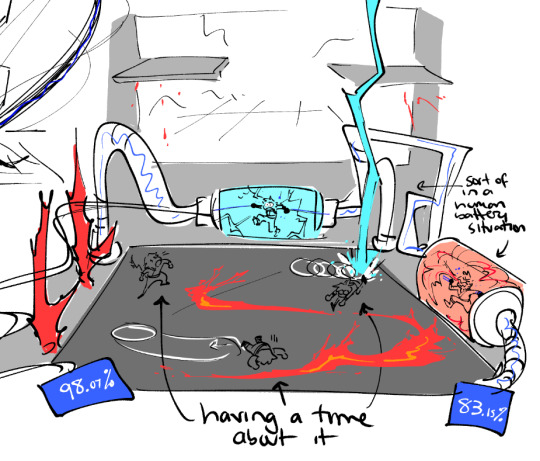
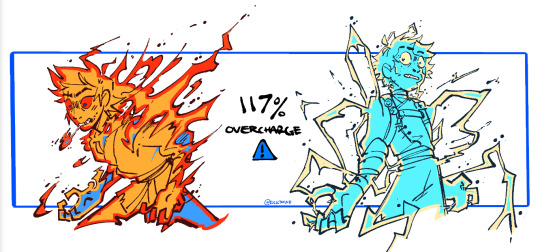

made a ninjago oc but all it wants to do is party
its name is WULFTRAX (all caps) and it’s playing this with zane extra info belooowww
pronouns: IT'S PRONOUNCED WOLF TRACKS LITTLE MAN (it/he/they)
species: WULFTRAX. digital? like, it HAS skin, and a skeleton, presumably, just… not a human head.
likes: game, rave
dislikes: no rave
wants: to party
character motivation: biggest loudest party
backstory: we think it came from prime empire, but that’s all we got. maybe an unused rhythm game dj…?
strengths: WULFTRAX does everything at 100%, and it doesn’t tend to stick around after a fight. it isn't fighting to win, it's fighting to go hogwild. on its back are one to six doc ock-like arms made of wire and interwoven with the stuff in season 9 that triggered everyone’s elemental powers.
weaknesses: can only attack on the beat, will only fight if there’s music. it’s actually not that strong, its robot arms and machinery do all the fighting. it prefers to fight/party using someone else — elementals party pretty hard, all their colors and glowing and exploding is its favorite.
alignment: very chaotic neutral. it does things on impulse and regardless of morals. he doesn’t seem to want to hurt anyone, just wants to party, and if hurting someone is how you gotta party, shrug! you can sway him pretty easily with the promise of a better rave. it’s not that clever, there is no scheming with this thing, but it does somehow get a lot of machinery and builds massive batteries and speakers and light shows
speech conventions: IT TALKS LIKE A FRAT BOY MET A CHRONICALLY ONLINE GAMER. NOT THE MOST COMPLICATED SENTENCES LMAO.
it also yells like everything it says due to the speakers in its mouth. its favorite people to mess with are kai, jay and lloyd. they have the shiniest explodiest powers, and are more split-second competitive.
#WULFTRAX#my art#‘I have made an oc to help/be friends with the ninja’ I have made an oc to fight them. I have made an oc to pummel them#people have done this before HAHDIDBDHDH except WULFTRAX is 1) a horrible fighter and 2) stupid#ninjago#ninjago oc#honestly it’s definitely someone you could/should use as a henchman. He won’t even realize. He will also destroy your lair#and then go OH MY BAD DUDE and that’s the end of that topic. Now it’s in your fridge#the second two images — it wanted to play DDR with jay and then went BRO YOU WANNA HELP WITH THIS SET so now Zane tricked it into -#bargaining to let jay out of the battery and it immediately agreed and then said WE’RE PLAYING OSU and didn’t leave room for argument so#now zane is playing a rhythm game he’s never played to let jay AND KAI out of the batteries and stop the rest of them from dying in#human osu! which was going to be its dance floor (it forgot people die when they’re hit by lightning)#And ALSO now they should probably stop it from holding the most dangerous rave#if the stuff they have is enough to send an elemental into superpowered overdrive it’s probably not healthy for a regular dude#as a meta note.#it’s obsessed w thrillseeking and adrenaline because he’s been alone for so so long that any new sensations are obsession-worthy#obsessed with feeling things and being real. doesn’t know how to regulate its obsession with something bc it has no sense of moderation#its primary purpose is to make big noise big party like programmed into it is its DJ sets. So now it makes the biggest loudest brightest#sets not understanding that this much noise/power can hurt someone or itself bc hurt is in fact an interesting sensation to it#it doesn’t KNOW this or underSTAND it. And it wouldn’t listen if told. BUT! that’s its pathology#IT HAS NO CONCEPT OF DEATH THERE IS NO THIS IS TOO DANGEROUS. THERE IS ONLY DA PORTY#it and porty mk would be besties#rule of cool with this thing. its cars are big its sets are big its music is loud and it’s got a giant flamethrower and a piano to drop#It broke from its programming but that doesn’t mean it broke from its programming yfeel#hrmmm.... yes........ self indulgent shiny loud digital dogmanthing#ill tag three of em theyre getting situations#kai smith#zane julien#jay walker
518 notes
·
View notes
Text
Random Patho 2 Thoughts While Playing The Game (spoilers!) #7
The cemetary lies halfway between the Town on the Gorkhon and the Kin camp; might be a stretch, but taking the placement literally could mean that between the town/Townsfolk and the Kin lies death/the dead, that they are connected and separated by death (symbolized, perhaps, most accutely by Isidor Burakh, whose funeral follows Kin traditions but is also visited by townsfolk etc.)
22 notes
·
View notes